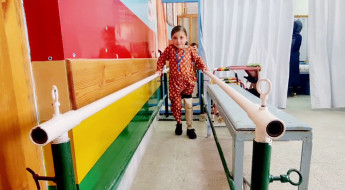Humanitarian crisis in Afghanistan

Faizabad is a city in north-east Afghanistan. it serves as the provincial capital and largest city of Badakhshan Province. Masoud SAMIMI/ICRC
Afghanistan has seen massive changes, but one thing is clear: The Afghan people cannot pay the price for these changes. Humanitarian needs in the country remain massive.
#Afghanistan is a beautiful country, but also one of heart-break.
— Peter Maurer (@PMaurerICRC) September 8, 2021
In my years as @ICRC president I have seen agony, suffering and despair in many of the world’s warzones.
But I cannot begin to express how deeply four decades of war has damaged the people of this nation. pic.twitter.com/HwxHscf21m
The ICRC continues to work in Afghanistan, as we have for 30 years.
With the Afghan Red Crescent, we will significantly increase the number of health structures we support, we will work to ensure the dignity of detained populations, to connect separated families across borders, including the immediate need to reunite children with their families.
— President of the ICRC, Peter Maurer
The ICRC has served the people of Afghanistan for 30 years. We won't stop now. The ICRC is not evacuating or withdrawing staff from Afghanistan. We remain operational across the country, together with our partner the Afghan Red Crescent Society.
Yesterday, an @ICRC convoy arrived Kandahar with much needed medical and logistic material to feed our operations in the South.
— Ignacio Casares (@ICasaresICRC) September 1, 2021
Kudos (and thanks!) to our Fleet and Security teams for facilitating this movement.
Facta, non verba.@ICRC_af pic.twitter.com/G2mzLfjbvk
Outside of Kabul, people continue to be injured by mines and explosive devices. Our staff at Mirwais Regional Hospital in Kandahar report receiving referrals from people wounded by explosive weapons, many of whom are children, and amputations are often required. This comes on top of having received a huge influx of patients injured by weapons during heavy fighting in recent weeks.
The ICRC has access across the country. We have been working in Taliban-controlled areas for years and we have a positive working relationship with them, at both the top level and the local leadership level. The changes in Afghanistan have not changed our relationship with them, and the current situation doesn't change the way we seek to operate.
Health needs in #Afghanistan are immense.
— Peter Maurer (@PMaurerICRC) September 8, 2021
In the past two months, we treated 41,000 people wounded by fighting.
We've doubled the number of clinics we support.
Overcoming years of war will take years. @ICRC will work side-by-side with the Afghan people for as long as it takes
Health care is a clear and urgent need. Thousands of people were injured in the last weeks as fighting raged in cities. We helped treat more than 7,600 people wounded by weapons in the first two weeks of August across 48 health care facilities. More than 40,000 people wounded by weapons have been treated at ICRC-supported facilities in June, July and August.

This 18-month-old boy suffers from club foot. He is undergoing treatment at the ICRC physical rehabilitation centre in Badakhshan, Faizabad. Masoud SAMIMI/ICRC
“The impact of recent fighting will be felt for the years and decades to come.”
— ICRC (@ICRC) August 16, 2021
Our Director-General @RMardiniICRC on the situation in #Afghanistan and our unwavering support for the Afghan people. pic.twitter.com/HyqFQMw4M7

